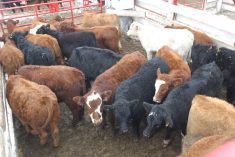The change is part of a provision in the USMCA trade deal to allow U.S. growers to sell registered varieties into Canada
Starting Aug. 1, Canadian growers who sell grain to a Canadian Grain Commission licensed facility will have to sign a declaration that the grain they’re selling is a variety registered in Canada.
Last March, Parliament approved the bill to implement the U.S.-Mexico-Canada Agreement, including amendments to the Canada Grain Act.
One of the changes allows grain sourced from the United States to receive an official Canadian grade in Canada as long as it’s a variety that’s registered in Canada.
Along with this change, it is now mandatory for growers from both Canada and the U.S. to sign the new declaration of eligibility.
Read Also

Critical growing season is ahead for soybeans
What the weather turns out to be in the United States is going to have a significant impact on Canadian producers’ prices
“For us, the pulse industry, this isn’t something we were seeking nor was it something that we had expected with the understanding that this U.S. complaint was on wheat. That’s what it’s meant to address,” said Mac Ros of Pulse Canada.
The change in the Canada Grain Act was made to address an irritant the U.S. had about what they perceived as discriminatory treatment of American grown wheat, which was not able to receive a statutory grade in Canada.
However, growers now have to sign a declaration for all grain delivered to a CGC licensed facility on either a crop year basis or for individual deliveries.
Ros said most of the buyer members in the Canadian Special Crops Association said they will be able to accommodate the use of the declaration and that it won’t be a big change in how they do business.
“Many of our buyers in the pulse industry in Canada already have a purchase contract or an annual pesticide declaration that more buyers are starting to use where they sign off that they only use certain pesticides,” Ros said.
“So a lot of our buyers are going to be able to implement this additional provision, saying that the grain is of a variety registered in Canada.”
He said most of the pulses grown in Canada are registered in Canada, but there are a few that are not registered, which instead rely on a CGC order that allows them to receive a statutory grade.
“When growers sign off on this declaration, even if they are growing one of these that aren’t registered but are covered by this order by the CGC, then they can still receive the highest grade,” Ros said.
“So because of that order, I would say that would cover most if not all of the varieties grown in Canada as being applicable to receive a Canadian grade.”
The declaration forms are available online, and Pulse Canada is working with the industry to ensure they are available everywhere pulse deliveries are received.
Ros said the new declaration doesn’t preclude a U.S. grower selling an unregistered variety into Canada, but this grain will not be able to receive a statutory grade.
“So a buyer can still buy a variety from the U.S. that’s not registered in Canada, just on a spec basis, for example, and they just can’t assign it a CGC grade,” Ros said.
Selling grain at a CGC licensed facility without a signed declaration is now an offence, and penalties are set out in Section 107 (2) of the Canada Grain Act.
Grain companies may refuse deliveries of grain without a corresponding signed declaration or give it the lowest grade established by the regulations.
If a custom grain hauler is used, growers should have signed a declaration form at that elevator before the delivery or sent a signed form with the load of grain being delivered.
Producers who used producer cars to sell to a licensed grain company also have to provide the declaration to the producer car administrator, who will give it to the grain company before the delivery.
For more information, visit bit.ly/393WduT.

















